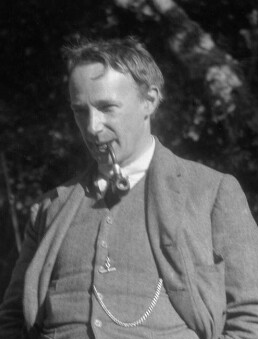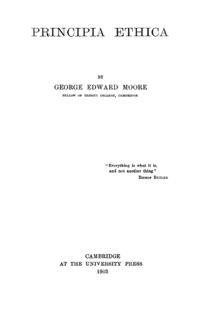G. E. Moore facts for kids
Quick facts for kids
G. E. Moore
|
|
|---|---|
 |
|
| Born |
George Edward Moore
4 November 1873 Hastings Lodge, Victoria Road, Dulwich Wood Park, Upper Norwood, London, England
|
| Died | 24 October 1958 (aged 84) Evelyn Nursing Home, Cambridge, England
|
| Other names |
|
| Education | Trinity College, Cambridge (B.A., 1896) |
| Spouse(s) | Dorothy Ely |
| Era | |
| Region | Western philosophy |
| School | Analytic philosophy Consequentialism |
| Institutions | Trinity College, Cambridge Aristotelian Society (president, 1918–19) Ethical Union (president, 1935–36) |
| Academic advisors | James Ward |
| Doctoral students | Casimir Lewy |
| Other notable students | R. B. Braithwaite |
|
Main interests
|
Philosophy of language |
|
Notable ideas
|
|
|
Influences
|
|
|
Influenced
|
|
George Edward Moore (born November 4, 1873 – died October 24, 1958) was an English philosopher. He was one of the main thinkers who started a way of thinking called analytic philosophy. Other important people in this group were Bertrand Russell and Ludwig Wittgenstein.
Moore and Russell helped change British philosophy. They moved away from a complex idea called idealism. Instead, they focused on common sense ideas. Moore also made important contributions to ethics (the study of right and wrong) and epistemology (the study of knowledge). People often said he had a very special personality and strong moral character.
Moore was a professor at the University of Cambridge. He also edited a famous philosophy magazine called Mind. He was part of a group called the Cambridge Apostles and later led the British Ethical Union (now Humanists UK).
Contents
Life of George Edward Moore
George Edward Moore was born in Upper Norwood, London, on November 4, 1873. He was one of seven children. His father, Daniel Moore, was a doctor. His older brother, Thomas Sturge Moore, was a poet and artist.
He went to Dulwich College for school. In 1892, he started studying at Trinity College, Cambridge. There, he studied classics (ancient Greek and Roman studies) and moral sciences (philosophy and human behavior). He became a Fellow at Trinity in 1898. Later, from 1925 to 1939, he held a special teaching position in Mental Philosophy and Logic at the University of Cambridge.
Moore is famous for defending the idea that 'goodness' cannot be defined by natural things. He also believed strongly in using common sense in philosophy. Another idea named after him is Moore's paradox. Many philosophers admired him and were influenced by his ideas.
Moore's writings are known for being very clear and careful. He thought that modern philosophy had not made much progress, unlike natural science which had grown a lot since the Renaissance. Some of his most famous books and essays include Principia Ethica, "The Refutation of Idealism", "A Defence of Common Sense", and "A Proof of the External World".
Moore was an important member of the Cambridge Apostles, a secret discussion group for smart people. Bertrand Russell, another famous philosopher, once said he "almost worship[ped] him as if he were a god."
From 1918 to 1919, Moore was the head of the Aristotelian Society. This group studies philosophy, its history, and its problems.
George Edward Moore passed away on October 24, 1958, in Cambridge. He was buried in the Ascension Parish Burial Ground. His wife, Dorothy Ely, is also buried there. They had two sons, Nicholas Moore and Timothy Moore.
Moore's Philosophy
What is Good? (Ethics)
Moore's book Principia Ethica is very important. It helped start a movement against the idea that you can define "good" using natural things. This book also made philosophers think more about meta-ethics, which is the study of what ethical terms like "good" actually mean.
The Naturalistic Fallacy
Moore believed that philosophers sometimes made a mistake he called the naturalistic fallacy. This happens when someone tries to define "good" by saying it's the same as something else. For example, a hedonist might say that "good" means "pleasant." But Moore argued that even if pleasant things are good, "pleasant" is not the definition of "good."
He said that the property of "goodness" cannot be defined using other words. You can only understand it directly. If you try to define it (like "X is good if it has property Y"), you just move the problem. Then you have to ask, "Why is Y good in the first place?"
The Open-Question Argument
Moore used the open-question argument to show that "good" cannot be defined. He said that if someone claims "Anything that is pleasant is also good," you can always ask, "But is it good that x is pleasant?" This question always makes sense, no matter what you try to use to define "good."
If "good" could be defined, then asking such a question would be silly or obvious. Since it's not silly, Moore concluded that "good" cannot be defined.
Good Cannot Be Defined
Moore argued that we cannot explain "good" using other words. He wrote:
- It may be true that all things which are good are also something else... But far too many philosophers have thought that when they named those other properties they were actually defining good...
He meant that we can't define "good" any more than we can define the color "yellow." We can point to a yellow object and say, "That is yellow." But we can't explain "yellow" to someone who has never seen colors. In the same way, we can point to a good action and say, "That is good."
Good as a Non-Natural Property
Moore also said that "good" is a non-natural property. This means you can't test it or find it using science. It's not something you can see, touch, or measure in the natural world.
How We Know What is Good
Moore thought that once we stop trying to define "good" using natural things, we can only understand what is truly good through what he called "moral intuitions." These are ideas that seem true to us when we think about them, even if we can't directly prove them. Because of this, some people call him an ethical intuitionist.
Moore also said that "duties" (what we should do) and moral rules can be figured out by looking at the effects of actions. So, if an action generally leads to good results, it might be a duty.
Right Actions, Duty, and Virtue
Moore believed that right actions are those that create the most good. However, it's hard to know all the consequences of our actions, especially in the long term. So, Moore suggested that our duties are actions that usually produce better results in the near future. These duties often match what common sense tells us.
Virtues, like honesty, are simply good habits or ways of being that help us perform our duties.
Proving the External World Exists
Moore famously disagreed with idealism, a philosophy that suggested the world we see might only exist in our minds. He defended a "common sense" view of realism, which means the world outside our minds is real.
In his essay "A Defence of Common Sense" (1925), he argued against people who doubted the existence of the outside world. He said that we have more reason to believe in common sense things (like that our hands are real) than to believe in the complex ideas of those who doubt reality.
He made this point very clearly in his 1939 essay "Proof of an External World." He held up his right hand and said, "Here is one hand." Then he held up his left hand and said, "And here is another." He concluded that since there are at least two external objects (his hands), an external world must exist.
Not everyone agreed with this simple proof. However, Moore argued that doubting common sense often relies on philosophical ideas that are less certain than the common sense beliefs they try to disprove. This argument also greatly influenced Ludwig Wittgenstein, another famous philosopher.
Moore's Paradox
Moore is also known for pointing out a strange problem called "Moore's paradox." It's about saying a sentence like, "It is raining, but I do not believe it is raining."
The puzzle is that it seems impossible for anyone to actually say this sentence and mean it. But if you look at it logically, there's no real contradiction. "It is raining" is about the weather, and "I don't believe it is raining" is about a person's belief. It's perfectly possible for it to rain while someone doesn't believe it. The paradox is that you can't honestly state both at the same time.
This puzzle also interested Ludwig Wittgenstein a lot. It's said that when Wittgenstein first heard about this paradox, he was so excited that he rushed to Moore's house late at night and asked him to repeat the whole lecture!
Organic Wholes
Moore described the idea of an organic whole simply:
- The value of a whole must not be assumed to be the same as the sum of the values of its parts.
This means that the total value of something can be greater than just adding up the values of its individual pieces. Imagine a complex situation. Moore said you can't just value each part separately and add them up to get the total value. The way the parts connect and work together can create a much greater value.
He used the example of a person experiencing a beautiful object. A beautiful object by itself has some value, and a person's consciousness has some value. But when a person is experiencing a beautiful object, the total value of that experience seems much greater than just adding the value of the object and the person. This is like how a human brain can think, even though individual brain cells (neurons) can't think on their own. The whole is more than the sum of its parts.
Works by G. E. Moore
- G. E. Moore, "The Nature of Judgment" (1899)
- G. E. Moore, Principia Ethica (1903)
- G. E. Moore, "The Refutation of Idealism" (1903)
- G. E. Moore, Ethics (1912)
- G. E. Moore, Philosophical Studies (1922)
- G. E. Moore, "A Defence of Common Sense" (1925)
- G. E. Moore, Some Main Problems of Philosophy (1953)
- G. E. Moore, Philosophical Papers (1959)
- G. E. Moore, The Early Essays (1986)
- G. E. Moore, The Elements of Ethics (1991)
Images for kids
-
The gravestone of G. E. Moore and his wife Dorothy Moore in the Ascension Parish Burial Ground, Cambridge
See also
 In Spanish: George Edward Moore para niños
In Spanish: George Edward Moore para niños



